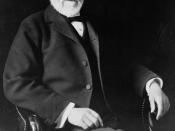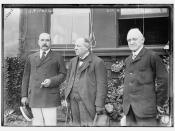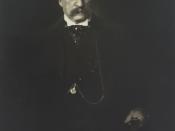The Industrial Era was the age of entrepreneurs and monopolies, power and wealth, haves and have-nots, in which a few thrived and feasted on the barely-living. The powerful men that controlled the business environment through the turn of the 20th century have set the standards for the business leaders of today. Andrew Carnegie, John D. Rockefeller, and John Pierpont Morgan also created controversy over how much power one person should be able to have in a capitalist economy. The world's most powerful banker at the time, J.P Morgan was seen physically and tactically as the human incarnation of authority and used it to change the economy in America. Although the power J.P Morgan accumulated during his status as 'most powerful financier' led to the enforcement of the Anti-Trust Laws, his personal character and business acumen have influenced America's financial and philanthropic standards, even today.
J.P Morgan was a significant factor in advancing the American economy to its high standard.
He actually saved the country from crisis at various times and prevented the economy from turning into a depression. His major influence came with the banks and United States, and how he changed the way the government thought about controlling money. His first show of power and importance was, "During a...financial crisis, Morgan loaned vast amounts of money to several banks to keep them from closing" (Levinson 35). That act alone proved his vital importance to American Society. The legacy he left was not just an ideological one, but led to many visible changes: "...this man played roles now assumed by the Federal Reserve, the Securities and Exchange Commission, [and] the Treasury"(Samuelson 247). During the economic crises, Morgan showed the world that a free market, which has little control, may need an individual with enough power and the perceptive discipline, to...


